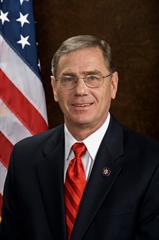Republican members of the House Financial Services Committee continued their assault on the Dodd-Frank Act and particularly the Consumer Financial Protection Bureau, created by the law, during hearings Thursday aimed at reforming the 2010 financial crisis bill.

GOP members of the Financial Services Subcommittee on Financial Institutions and Consumer Credit, who have been working to repeal Dodd-Frank for the past few congresses, sharply criticized the CFPB, one of the main aspects of the rescue law.
The CFPB, said U.S. Rep. Roger Williams (R-TX), “already extorted hundreds of millions of dollars from auto lenders.” U.S. Rep. David Trott (R-MI) said attorneys, community bankers and small business owners in his district are “all terrified” of the CFPB and its ability to extract civil monetary settlements.
The remarks came a day after CFPB Director Richard Cordray came under attack by Republicans during testimony before the full committee, with Chairman Jeb Hensarling (R-TX) calling for his firing. “I believe the president is clearly justified in dismissing you and I call upon the president … to do just that, and to do it immediately,” said Hensarling, who has led the repeal effort since taking over its chairmanship five years ago.
The committee and the Republican-controlled House have passed several bills aimed at repealing Dodd-Frank in the past few years but have run afoul of the Democratic-controlled Senate, which helped pass the bill. But this year Republicans favoring a repeal or reform of the bill control both chambers of Congress, making it likely they will be able to send a bill to the president’s desk at some point. President Donald Trump has indicated a willingness to repeal or change the financial crisis bill.
Bill Himpler, president of the American Financial Services Association, which represents payday loan and subprime auto lenders, told the panel his members have been unfairly targeted by the CFPB and have been deluged by a flood of regulations that amount to lawmaking by federal bureaucrats.
Blaine Luetkemeyer (R-MO), chairman of the subcommittee, told Himpler, “It’s really problematic; an agency promulgates rules then enforces it. To me, that’s a law and there’s only one body that can enforce a law, and that’s us.”
Himpler, whose members have been a major target of the CFPB, said the brunt of the agency’s regulations are aimed at non-bank financial companies that are already regulated by state agencies. He said the CFPB’s regulations need more clarity and explanation. The CFPB, said Himpler, operates in a “gotcha environment where you don’t know what the rules are.”
Norbert Michel, a fellow at the conservative Heritage Foundation, which is also advocating for reform to Dodd-Frank, told lawmakers the CFPB is unnecessary for consumer protection because the Federal Trade Commission and other federal agencies are adequate for the task.
“The CFPB,” said Michel, “constrains access to credit and erodes Americans’ financial independence. Furthermore, the CFPB is unaccountable to the public in any meaningful way, and raises serious due process and separation of powers concerns.”
Michel renewed calls for the combination of the Commodities Future Trading Commission with the Securities and Exchange Commission, a proposal that has long been argued in Washington but fallen short because of bureaucratic turf wars.
He also renewed calls for the elimination of bank supervisory responsibility, leaving the Fed with powers to regulate interest rates and the money supply only.
Other witnesses called for a variety of regulatory cutbacks as part of the GOP efforts.
Greg Baer, president of the Clearing House Association, which represents 24 of the nation’s biggest banks, called for reforms to the Federal Reserve’s stress test which measures the big banks’ capital adequacy. The stress tests, he said, are becoming a binding constraint for most large banks and banks are changing their portfolios consistent with its implicit mandates, creating a “considerable economic impact.”
Also testifying Thursday was Amias Gerety, former acting assistant secretary for financial institutions at the U.S. Department of the Treasury, who helped draft Dodd-Frank. Gerety explained that many of the reform laws provisions were necessary and have proven useful in curbing some of the excesses that helped cause the financial crisis.